Table of Contents
Get started with MyPerfectResume today!
- Build a resume on any device
- Pick an ATS-friendly template
- Tailor with AI copy suggestions
Why this resume works
- Quantifies accomplishments: By citing metrics such as a 20% cost reduction and 30% efficiency boost, the applicant’s accomplishments paint a clear picture of their strong contributions.
- Showcases career progression: Progression from warehouse operations specialist to logistics manager illustrates the applicant’s journey through escalating roles, showcasing their dedication and readiness for increased responsibility.
- Uses action-oriented language: With action verbs like “optimized,” “implemented,” and “streamlined,” the resume captures initiative and effectiveness.
More Logistics Manager Resume Examples
Browse these logistics manager resume examples to discover how to highlight your organizational skills, supply chain expertise, and leadership experience. These samples will help you craft a resume that attracts potential employers in the industry.
Entry-level logistics manager
Why this resume works
- Puts skills at the forefront: By prioritizing skills like inventory management and vendor management at the top, the applicant leverages a skills-based resume format, which is ideal for showcasing relevant capabilities early in one’s career.
- Shows digital literacy: Implementing new inventory tracking software highlights digital readiness, illustrating the candidate’s strong computer skills needed for today’s tech-centric logistics roles.
- Effective use of keywords: By integrating terms such as “supply chain coordination” and “cost reduction strategies,” the applicant effectively includes role-specific keywords to improve ATS compatibility.
Mid-level logistics manager
Why this resume works
- Points to measurable outcomes: The applicant’s ability to cut costs by 15% and achieve a 99% on-time delivery rate showcases an impressive knack for driving measurable outcomes in logistics.
- Includes a mix of soft and hard skills: Combining technical skills like supply chain optimization with interpersonal skills, the applicant effectively balances analytical abilities and team leadership.
- Demonstrates language abilities: The applicant’s language skills in Spanish, French, and German improve cross-cultural communication essential for international logistics roles.
Experienced logistics manager
Why this resume works
- Focuses on work history: Using a chronological resume, the applicant structures an extensive career timeline, emphasizing steady growth from operations coordinator to logistics manager with measurable results.
- Showcases impressive accomplishments: Notable achievements, like saving $2M through cost reduction strategies and reducing delivery times by 25%, reflect senior-level impact.
- Lists relevant certifications: Listing certifications such as Certified Supply Chain Professional and Lean Six Sigma Green Belt reinforce expertise in streamlining logistics processes and commitment to continuous learning.
Logistics Manager Resume Template (Text Version)
Tao Kim
Tampa, FL 33605
(555)555-5555
Tao.Kim@example.com
Professional Summary
Accomplished logistics manager enhancing efficiency by 30%. Expert in optimizing supply chains and reducing costs by 25%. Proven track record in team leadership and strategic project planning.
Work History
Logistics Manager
Horizon Freight Systems – Tampa, FL
May 2022 – August 2025
- Optimized routes, cut costs by 20%
- Led team of 15, improved efficiency by 30%
- Enhanced supply chain, boosted deliveries by 15%
Supply Chain Supervisor
Midwest Logistics Inc. – Jacksonville, FL
May 2019 – April 2022
- Reduced inventory costs by 12%
- Managed shipments, increased accuracy by 25%
- Implemented ERP, reduced errors by 18%
Warehouse Operations Specialist
Summit Storage Solutions – Tampa, FL
May 2017 – April 2019
- Streamlined processes, cut time by 10%
- Coordinated logistics, boosted output by 22%
- Trained staff, improved accuracy by 15%
Languages
- Spanish – Beginner (A1)
- French – Intermediate (B1)
- German – Beginner (A1)
Skills
- Operational Optimization
- Supply Chain Management
- Inventory Control
- Team Leadership
- Process Improvements
- Cost Reduction Techniques
- Strategic Planning
- ERP System Implementation
Certifications
- Certified Supply Chain Professional – APICS
- Lean Six Sigma Green Belt – International Association for Six Sigma Certification
Education
Master of Business Administration Supply Chain Management
Northwestern University Evanston, Illinois
May 2017
Bachelor of Science Logistics and Transportation
University of Illinois Urbana-Champaign, Illinois
May 2015
Related Resume Guides
Advice for Writing Your Logistics Manager Resume
Learn how to write a resume for a logistics manager that highlights your expertise in supply chain management, inventory control, and team leadership.
Let’s make your resume stand out in the logistics industry!
Highlight your most relevant skills
Listing relevant skills when applying for a job like logistics manager is important because it helps employers quickly see if you are a good fit for the role.
A dedicated skills section makes it easy to highlight both your technical skills, like supply chain management and inventory control, and your interpersonal skills, such as leadership and communication. This balance shows that you can handle the technical aspects of the job while also working well with others.
To make an even stronger impact, try integrating key skills into your work experience section. For example, mention how your knowledge of logistics software helped improve delivery times at your last job or how your team leadership reduced shipping errors.
This approach not only highlights your skills but also shows real-world examples of how you’ve used them successfully in past roles. By doing this, you make it clear to employers that you have both the skills and the experience needed to be an effective logistics manager.
A resume format that highlights efficient supply chains, deadlines met, and teams led can help logistics managers make a strong impression.
Showcase your accomplishments
When showcasing your accomplishments as a logistics manager, start by organizing your work experience in reverse-chronological order. For each job entry, include the job title, employer name, location, and employment dates. This clear structure helps hiring managers easily follow your career progression.
Quantifying your accomplishments makes your resume more compelling than just listing job responsibilities. Turn duties into achievements by incorporating measurable results like percentages, time savings, cost reductions, or efficiency improvements. For example, instead of saying you “managed inventory,” say you “reduced inventory costs by 20% through improved forecasting.”
Use action-oriented verbs that focus on core duties and measurable achievements. Words like “streamlined,” “optimized,” or “increased” show you’re proactive and results-driven. Quantified accomplishments help hiring managers quickly see your impact and skills. By highlighting specific successes with numbers, you make it easier for them to understand how you can add value to their team.
5 logistics manager work history bullet point examples
- Coordinated supply chain operations, achieving a 25% reduction in delivery times and improving customer satisfaction.
- Implemented an inventory management system that decreased stock discrepancies by 40% and improved order accuracy.
- Led a team of 10 logistics personnel to streamline warehouse operations, increasing productivity by 20%.
- Negotiated with suppliers to secure cost-effective contracts, resulting in annual savings of $500,000.
- Developed and executed logistics strategies for new product launches, ensuring on-time delivery across 50+ retail locations.
Choose a resume template that is simple and neat. Opt for clear headings and readable fonts, avoiding extra design elements to make your experience and skills stand out.
Write a strong professional summary
A professional summary is a brief introduction at the top of your resume, giving hiring managers an overview of your qualifications. You can choose between a summary or objective to start your resume, depending on your current level of experience.
Typically three to four sentences long, a professional summary showcases your experience, skills, and achievements. It’s best for experienced applicants and aims to show your professional identity and value to potential employers. It helps them quickly understand what you bring to the table.
Resume objectives are statements about career goals. They work well for entry-level applicants, people changing careers, or those with gaps in employment. While summaries focus on “what I’ve accomplished,” objectives highlight “what I aim to contribute.”
Next, we’ll provide examples of both professional summaries and resume objectives tailored to different experience levels.
Logistics manager resume summary examples
Entry-level
Recent graduate with a Bachelor of Science in Logistics and Supply Chain Management. Certified in Six Sigma Yellow Belt, experienced with inventory control and transportation management through internships. Possesses strong analytical skills and a keen interest in optimizing logistics operations to improve efficiency.
Mid-career
Logistics manager with over seven years of experience in distribution and warehouse management. Proven track record in reducing shipping costs by 15% through route optimization and supplier negotiations. Skilled in team leadership, ERP systems, and maintaining high standards for order fulfillment accuracy. Known for improving operational workflows and fostering collaborative environments.
Experienced
Seasoned logistics manager specializing in global supply chain strategy with more than 15 years of expertise. Demonstrated success in leading multi-million dollar projects, improving international logistics networks, and implementing advanced technologies for real-time tracking. Strong leadership abilities with a focus on continuous improvement initiatives that have increased overall productivity by 20%. Dedicated to mentoring teams and driving long-term growth.
Logistics manager resume objective examples
Entry-level
Aspiring logistics manager with a Bachelor of Science in Supply Chain Management seeking to leverage academic knowledge and internship experience in a fast-paced logistics environment. Committed to optimizing distribution processes and contributing to efficient supply chain operations.
Career changer
Detail-oriented professional transitioning from customer service to logistics management, eager to apply strong organizational and problem-solving skills in streamlining warehousing and distribution processes. Dedicated to learning new industry practices and improving operational efficiency.
Recent graduate
Driven recent graduate in business administration focusing on logistics, aiming to start a career as a logistics manager by using analytical skills and coursework knowledge. Passionate about supporting the development of sustainable supply chain strategies within an innovative company.
Show off your logistics manager skills fast with our AI Resume Builder. Choose a layout, add your details, and get a professional-looking resume quickly!
Match your resume to the job description
Tailoring your resume to the job descriptions is important because it helps you stand out and get noticed by employers. Many companies use applicant tracking systems (ATS) to scan resumes for specific keywords from the job posting. If your resume matches these keywords, it’s more likely to be seen by a hiring manager.
An ATS-friendly resume includes the right keywords and phrases that align your skills with those in the job description, increasing your chances of getting noticed. For example, if you are applying for a logistics manager position, include terms related to supply chain management and inventory control.
To find these keywords, read the job posting carefully. Look for words or phrases that are repeated or emphasized, like “inventory management,” “supply chain optimization,” or “logistics planning.” These are usually important skills or duties that employers prioritize.
When adding these terms to your resume, make sure they fit naturally into your previous work experiences. Instead of just copying phrases, rewrite them to describe what you did in past jobs. For instance, change “Manage supply chains effectively” to “Effectively managed supply chains to ensure timely deliveries.”
By taking the time to customize your resume with relevant keywords, you’re more likely to pass through ATS filters and catch the attention of hiring managers. This approach strengthens your application and increases your chances of landing an interview.
Try our ATS Resume Checker to find and fix over 30 common resume mistakes. Get quick tips on improving your resume score right away.
FAQ
Do I need to include a cover letter with my logistics manager resume?
Yes, including a cover letter with your logistics manager resume is a great way to make your application stand out.
A cover letter lets you highlight your expertise in managing supply chains, optimizing logistics processes, and leading teams effectively.
For instance, if the company you’re applying to has specific logistics challenges or uses certain technologies, you can discuss relevant experiences where you’ve successfully tackled similar issues.
Consider using our Cover Letter Generator to craft a personalized letter that aligns with your resume, ensuring all key skills are highlighted.
Checking out various cover letter examples can also offer insights into how to structure your letter and what content resonates best with employers in the logistics field.
How long should a logistics manager resume be?
For a logistics manager, a one-page resume is often sufficient, especially early in your career when focusing on key skills like supply chain management and team leadership is enough to capture your expertise.
If you have extensive experience or specialized certifications, a two-page resume might better present your accomplishments in areas like inventory control and process optimization.
Remember, the goal is clarity and relevance. Include only information directly related to logistics management to keep the reader’s interest. For more guidance tailored to different stages of your career, explore our guide on how long a resume should be.
How do you write a logistics manager resume with no experience?
To craft a resume with no experience for a logistics manager position, emphasize your relevant skills, education, and any training or volunteer work that demonstrates your potential for the role.
- Emphasize education: Start with your degree in supply chain management, business administration, or a related field. Include the name of the institution, graduation date, and any honors or relevant coursework.
- Showcase transferable skills: Highlight skills such as organization, problem-solving, time management, and skill in logistics software. These can be developed through part-time jobs, internships, or volunteer experiences.
- Include relevant projects: If you’ve worked on any projects during your studies that involved logistics planning or inventory management, detail these experiences to demonstrate practical knowledge.
- Add certifications: Mention any certifications like Certified Supply Chain Professional (CSCP) or Lean Six Sigma that you have earned to show commitment and expertise in logistics.
Check out our detailed guide on writing a resume with no experience for more tips and sample templates tailored to entry-level professionals.
Rate this article
Logistics Manager
Share this page
Additional Resources
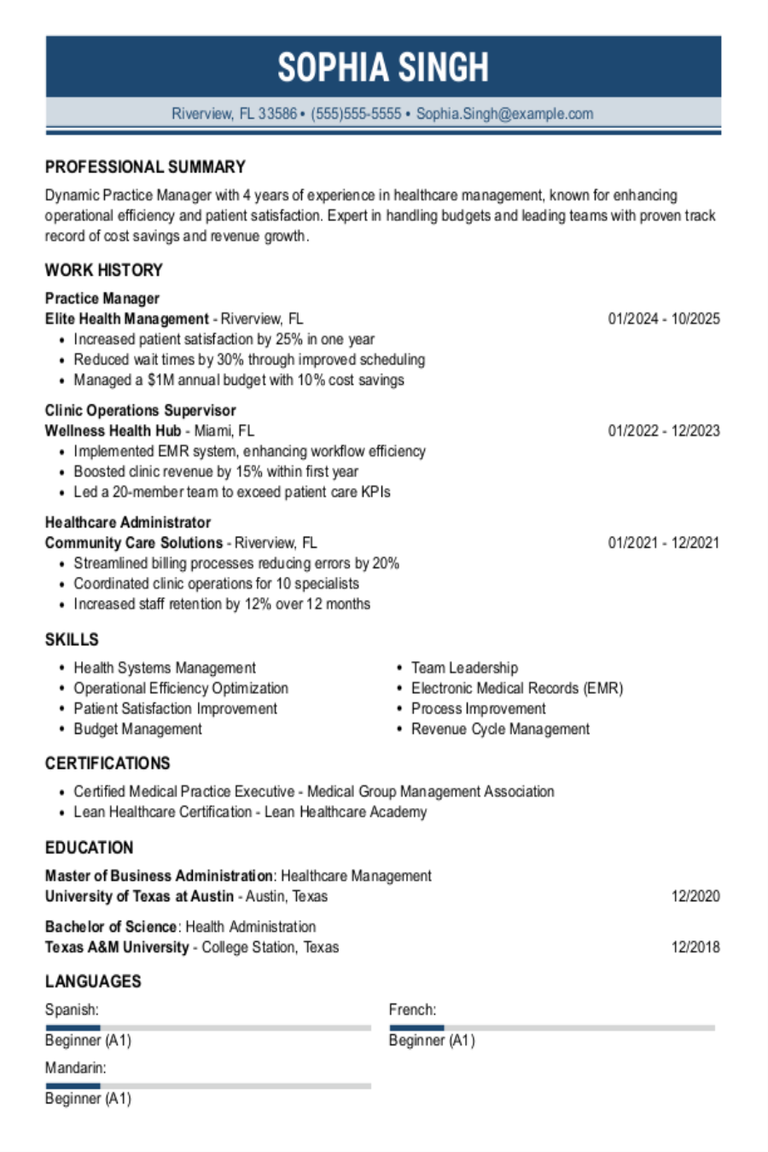
Practice Manager Resume Examples & Templates
Explore practice manager resume examples and tips to learn how to highlight your relevant skills and experience managing staff schedules and improving patient experiences.Build my resumeImport existing resumeCustomize this templateWhy

25 Interview Questions for Managers (With Answers & Tips)
Success in a management interview starts long before the conversation begins. Taking the time to prepare thoughtful responses to common interview questions for managers helps you clearly communicate leadership experience
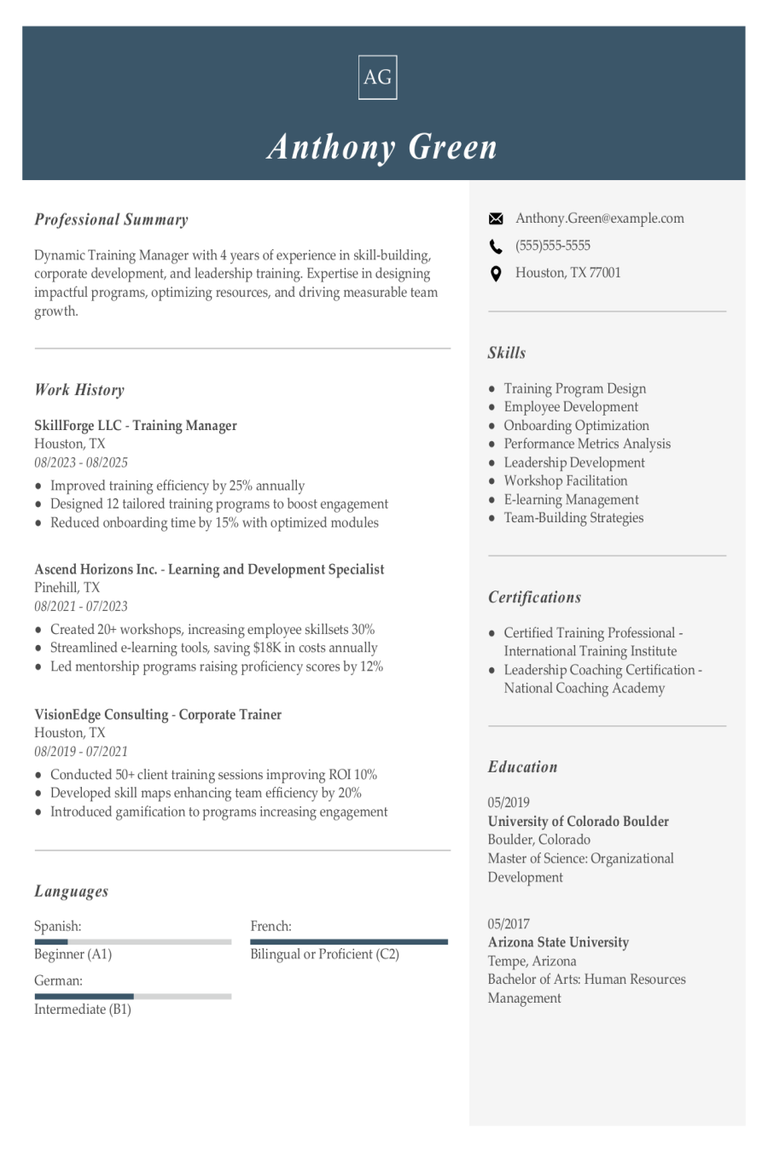
Training Manager Resume Examples & Templates
Discover how training managers showcase their skills in leading workshops and improving employee performance on their resumes. Our examples and tips will help you craft a resume that stands out
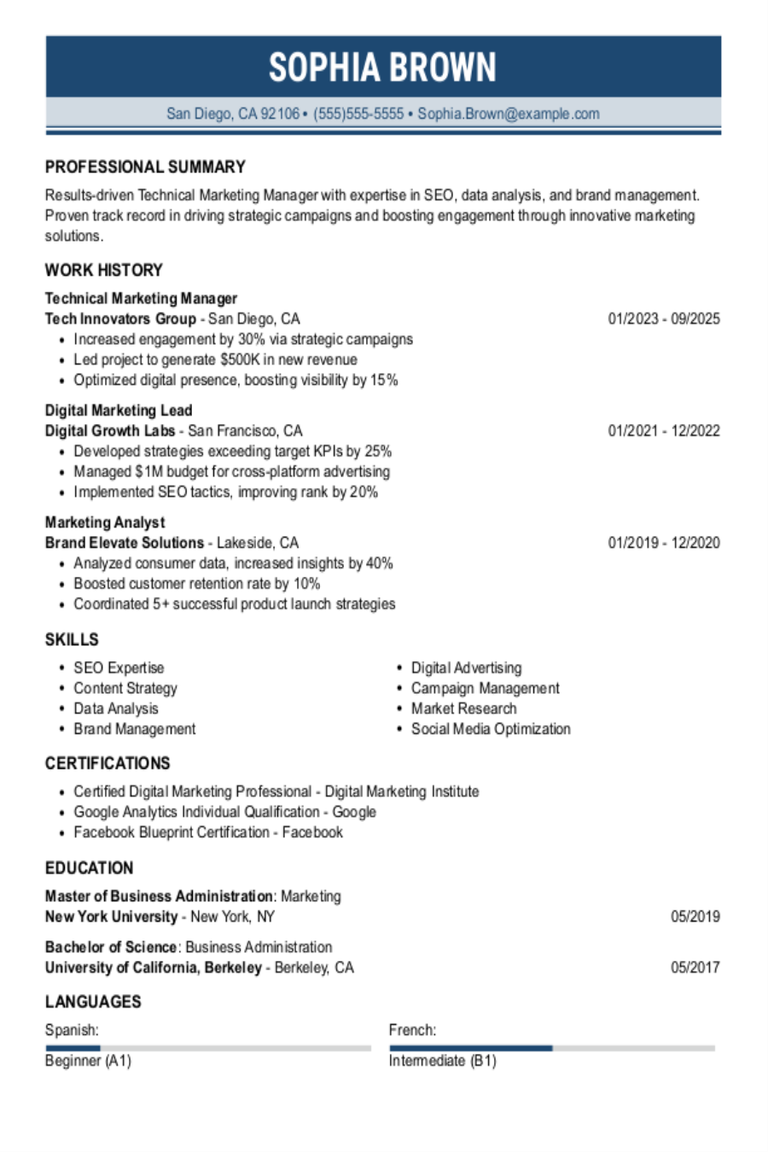
Technical Marketing Manager Resume Examples & Templates
Discover how to craft a technical marketing manager resume that shines. Learn to highlight your tech-savvy skills, marketing strategies, and project successes effectively.Build my resumeImport existing resumeCustomize this templateWhy this
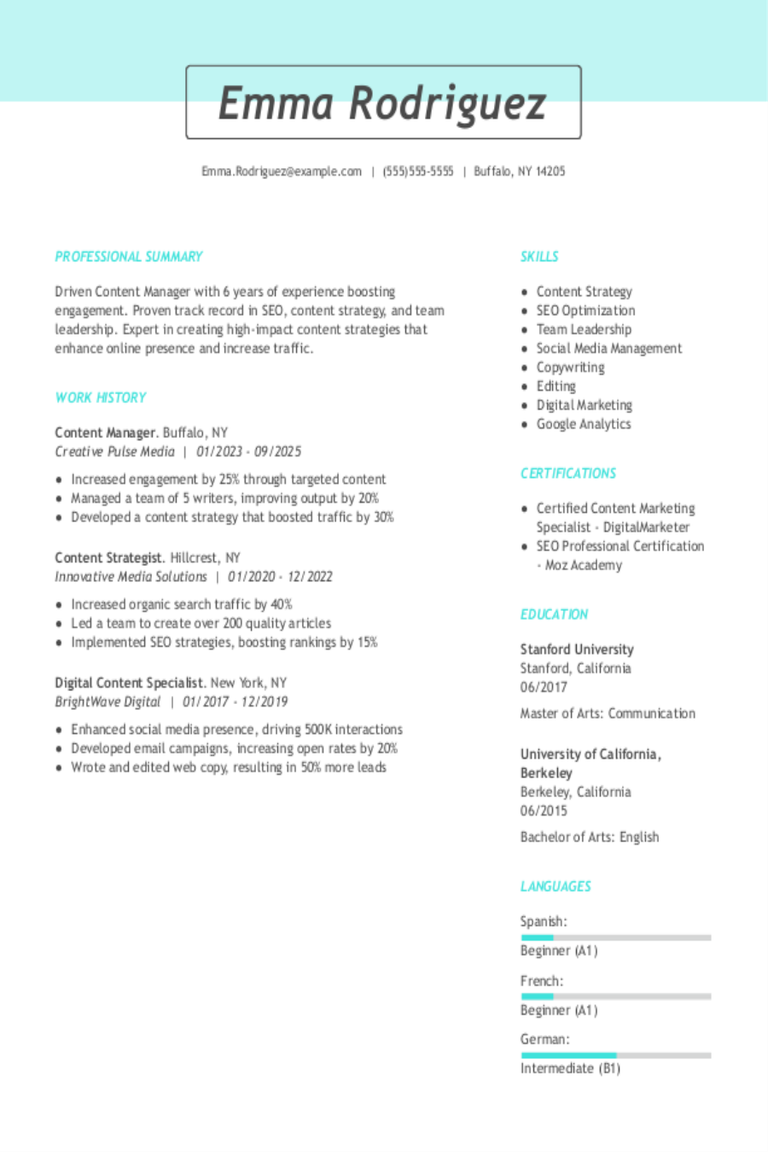
Content Manager Resume Examples & Templates
Browse content manager resume examples to see how to highlight your experience organizing, creating, and sharing engaging materials across platforms. These examples and tips help you showcase creativity, leadership, and
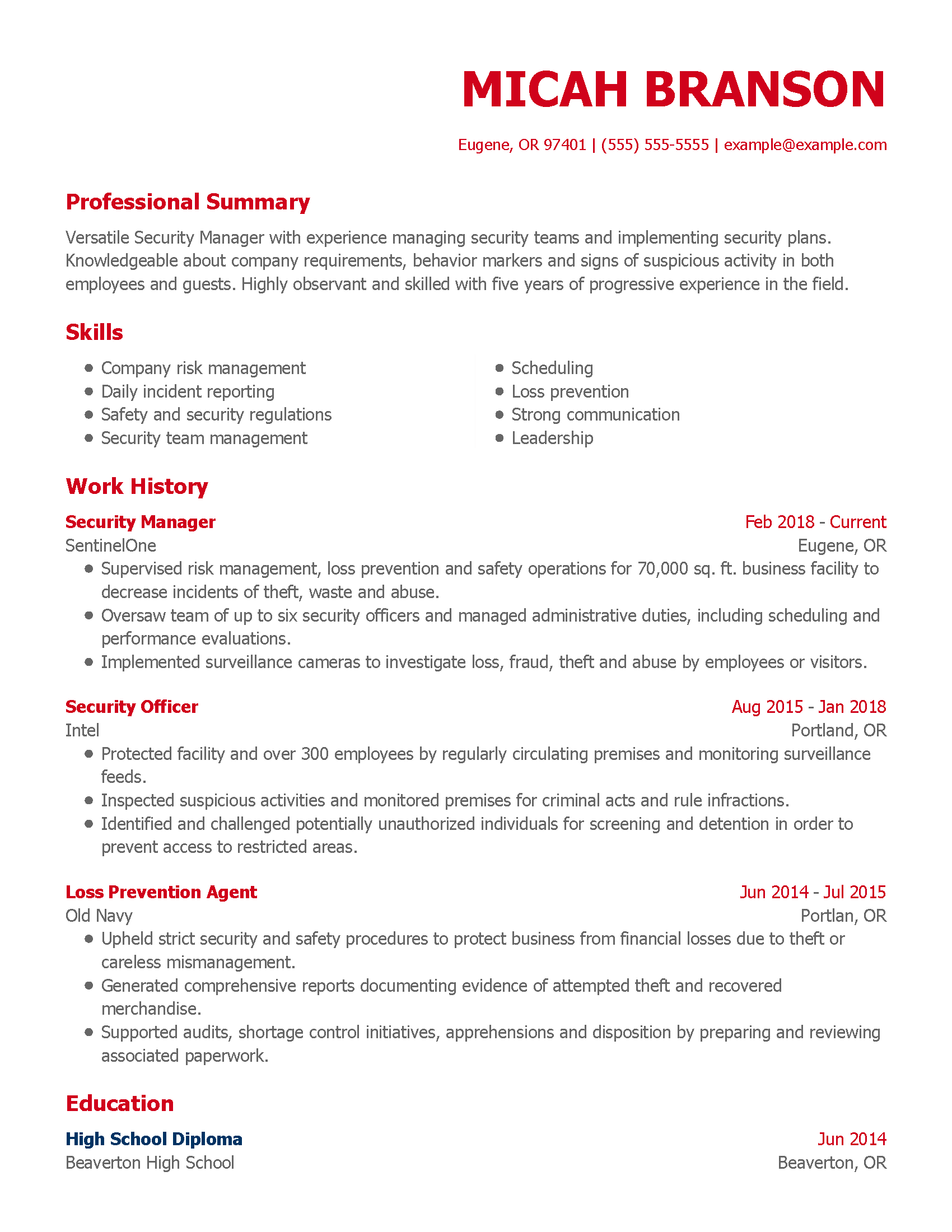
Security Manager Resume Examples & Templates
Explore security manager resume examples that showcase leadership, emergency response, and risk management. Get tips to highlight your skills and experience in keeping people and property safe.Build my resumeImport existing
